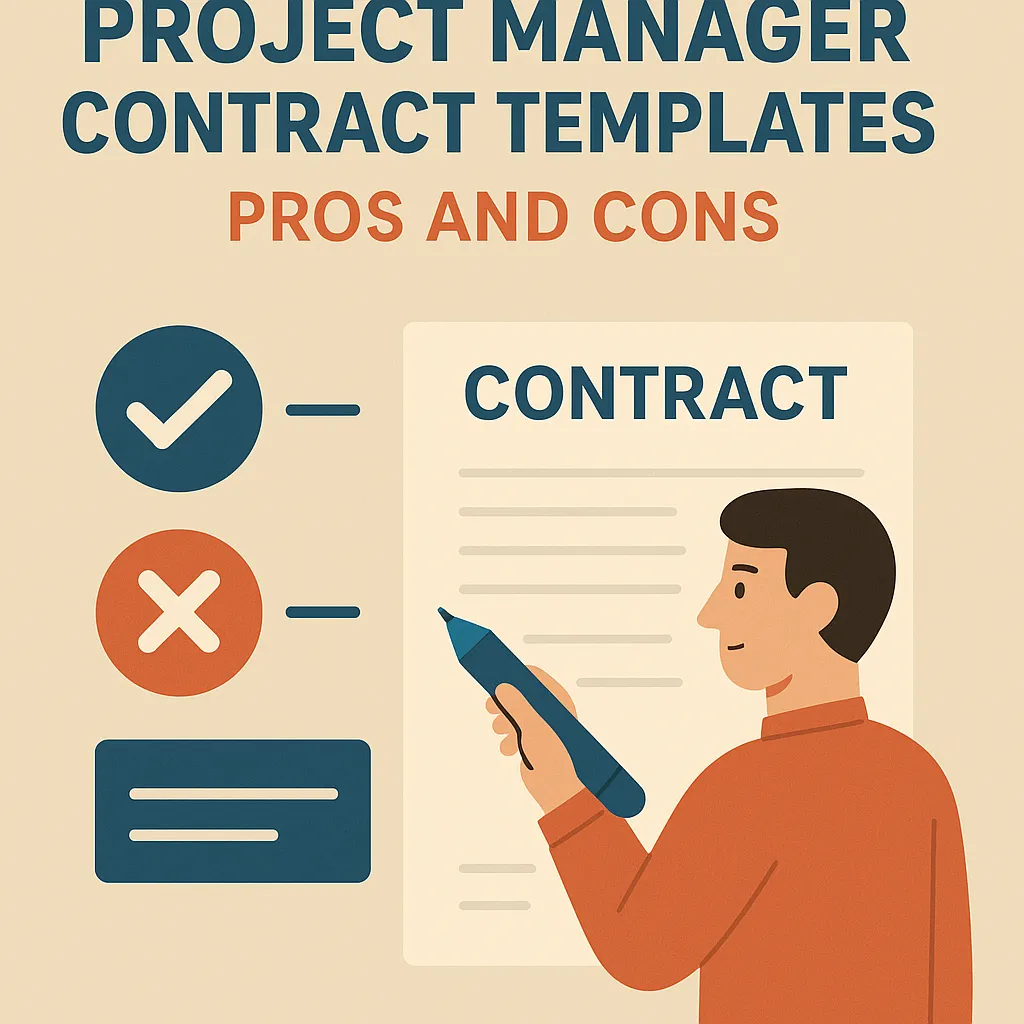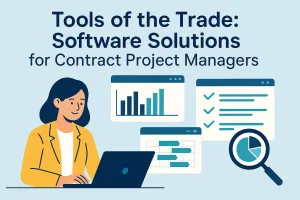Introduction to Project Manager Contracts
A project manager contract serves as a crucial legal agreement that delineates the terms and conditions under which a project manager will operate. This contract typically outlines the scope of work, timelines, budgetary constraints, and specific responsibilities of the project manager, ensuring that all parties involved have a clear understanding of their roles and expectations.
Definition of a Project Manager Contract
A project manager contract is a formal document that establishes the relationship between the project manager and the client or organization. It specifies the deliverables, performance metrics, and payment terms, thereby providing a framework for accountability and performance evaluation. This contract is essential for setting clear expectations and minimizing misunderstandings throughout the project lifecycle [2].
Importance of Contracts in Project Management
Contracts play a pivotal role in project management for several reasons:
- Clarity and Structure: They provide a structured approach to project execution, ensuring that all stakeholders are aligned on objectives and deliverables [3].
- Risk Mitigation: By clearly defining roles and responsibilities, contracts help mitigate risks associated with project execution, such as scope creep or budget overruns [5].
- Legal Protection: A well-defined contract protects both the project manager and the client by outlining the legal obligations of each party, which can be crucial in case of disputes [2][9].
Overview of How Templates Can Streamline the Contract Creation Process
Utilizing contract templates can significantly enhance the efficiency of the contract creation process for new project managers and administrative staff. Here are some advantages of using templates:
- Time-Saving: Templates provide a ready-made structure that can be quickly customized to fit specific project needs, reducing the time spent on drafting contracts from scratch [4].
- Consistency: They promote consistency across contracts, ensuring that similar projects adhere to the same standards and terms, which can be particularly beneficial for organizations managing multiple projects [4].
- Reduced Errors: By using established templates, project managers can minimize the risk of omitting critical information or making errors that could lead to legal complications [5].
What Are Project Manager Contract Templates?
Project manager contract templates are preformatted documents designed to streamline the process of creating contracts for project management. These templates serve as a foundational framework that project managers and administrative staff can customize to fit the specific needs of their projects. By utilizing these templates, new project managers can save time and ensure that essential elements are included in their contracts, thereby reducing the risk of overlooking critical details.
Definition and Characteristics
- Definition: A project manager contract template is a standardized document that outlines the terms and conditions of a project agreement between parties involved. It provides a structured format that can be easily modified to suit different projects and stakeholders.
- Characteristics: These templates typically include placeholders for specific project details, making it easier for users to fill in relevant information. They are designed to be user-friendly, allowing individuals with varying levels of legal knowledge to create effective contracts without starting from scratch.
Common Sections Included in Templates
Project manager contract templates generally encompass several key sections that are crucial for defining the scope and expectations of a project. Common sections include:
- Scope of Work: This section outlines the specific tasks and deliverables expected from the project, ensuring all parties have a clear understanding of what is to be accomplished.
- Duration: Here, the timeline for the project is specified, including start and end dates, as well as any milestones that need to be met along the way.
- Payment Terms: This section details the financial aspects of the contract, including payment schedules, amounts, and any conditions for payment, which are essential for managing project budgets effectively.
- Liabilities and Responsibilities: It defines the obligations of each party, helping to clarify who is responsible for what, which is vital for accountability.
- Termination Clauses: This outlines the conditions under which the contract can be terminated, providing a safety net for both parties in case the project does not proceed as planned.
Sources for Obtaining Templates
New project managers can find contract templates from various sources, ensuring they have access to reliable and relevant documents. Some common sources include:
- Online Resources: Numerous websites offer free or paid project management contract templates. These resources often provide a variety of templates tailored to different industries and project types.
- Legal Services: Consulting with legal professionals can provide access to professionally drafted templates that comply with local laws and regulations, ensuring that the contracts are legally sound.
- Project Management Software: Many project management tools come equipped with contract management features, including customizable templates that can be integrated into the project workflow.
By understanding the purpose and structure of project manager contract templates, new project managers and administrative staff can effectively utilize these resources to enhance their contract creation process, ultimately leading to more successful project outcomes.
Pros of Using Project Manager Contract Templates
Utilizing contract templates can significantly benefit new project managers and administrative staff by streamlining the contract creation process. Here are some key advantages:
- Time Efficiency in Drafting Contracts: Templates can drastically reduce the time required to draft contracts. By providing a pre-structured format, project managers can quickly fill in specific details rather than starting from scratch, allowing for faster project initiation and delivery [1].
- Consistency in Contract Terms Across Projects: Using templates ensures that the same terms and conditions are applied consistently across different projects. This uniformity helps maintain a standard approach to contract management, which can be particularly beneficial for organizations that handle multiple projects simultaneously [1].
- Reduced Risk of Missing Essential Clauses: Templates are designed to include all necessary clauses that are typically required in contracts. This reduces the likelihood of omitting critical elements that could lead to disputes or misunderstandings later on. A well-drafted template acts as a safeguard against common pitfalls in contract creation [3][8].
- Ease of Customization for Specific Project Needs: While templates provide a solid foundation, they are also flexible enough to be customized for specific project requirements. New project managers can easily modify sections of the template to address unique aspects of their projects, ensuring that the contract is tailored to fit the specific context while still adhering to best practices [7][9].
Cons of Using Project Manager Contract Templates
While project manager contract templates can provide a useful starting point for new project managers and administrative staff, there are several drawbacks to consider when relying on these pre-formatted documents. Here are some key points highlighting the potential limitations of using templates in contract creation:
- Risk of Over-Reliance on Generic Clauses: Templates often contain standard clauses that may not be tailored to the specific needs of a project. This can lead to a situation where critical project-specific details are overlooked, resulting in contracts that do not adequately protect the interests of the parties involved. Generic clauses may fail to address unique project requirements, which can create ambiguity and lead to disputes later on [4].
- Potential for Overlooking Unique Project Details: Each project has its own set of circumstances, stakeholders, and objectives. Relying heavily on templates can result in the omission of important details that are crucial for the successful execution of a project. This oversight can hinder effective communication and understanding between project managers and contractors, potentially leading to misunderstandings and conflicts [5].
- Limitations in Legal Enforceability: If templates are not properly customized to reflect the specific terms and conditions of a project, they may lack legal enforceability. Contracts that do not accurately represent the agreement between parties can be challenged in court, which may result in unfavorable outcomes for the project manager or organization. It is essential to ensure that all contractual obligations are clearly defined and tailored to the project at hand [10].
- Possibility of Outdated Information: Many templates may contain outdated information or references to laws and regulations that have changed over time. Using such templates without verifying their relevance can lead to compliance issues and legal challenges. Project managers must be diligent in reviewing and updating templates to ensure they reflect current legal standards and best practices [7].
Best Practices for Using Contract Templates
Using contract templates can significantly streamline the process of contract creation for project managers, especially for those who are new to the field. However, to maximize their effectiveness, it is essential to follow certain best practices. Here are some key points to consider:
- Tailoring Templates to Fit Individual Project Needs: While templates provide a solid foundation, it is crucial to customize them to align with the specific requirements of each project. This involves defining the Statement of Work (SOW) clearly, which outlines expectations and deliverables for the project. By doing so, project managers can ensure that the contract accurately reflects the unique aspects of the project, thereby reducing the risk of misunderstandings or disputes later on [5].
- Importance of Reviewing and Updating Templates Regularly: Contracts should not be static documents. Regular reviews and updates are necessary to ensure that templates remain relevant and effective. This practice helps incorporate changes in laws, regulations, and organizational policies, as well as lessons learned from previous projects. By maintaining an up-to-date template, project managers can enhance compliance and reduce potential legal issues [4].
- Consulting with Legal Experts When Necessary: Engaging legal counsel or a contract specialist during the contract drafting process is a best practice that can safeguard against potential pitfalls. Legal experts can provide insights into the nuances of contract law and help ensure that the terms are enforceable and protect the interests of all parties involved. This step is particularly important after each round of negotiations to confirm that the contract reflects the agreed-upon terms accurately [4].
- Incorporating Feedback from Previous Projects to Improve Contracts: Learning from past experiences is invaluable in project management. Gathering feedback from team members and stakeholders about previous contracts can highlight areas for improvement. This iterative process allows project managers to refine templates based on real-world applications, making them more effective for future projects. By integrating this feedback, project managers can create contracts that better serve their objectives and enhance overall project success [3].
By following these best practices, new project managers and administrative staff can effectively utilize contract templates, ensuring that they are not only efficient but also tailored to meet the specific needs of their projects. This approach not only saves time but also contributes to better project outcomes and stakeholder satisfaction.
Find out more about Shaun Stoltz https://www.shaunstoltz.com/about/.
This post was written by an AI and reviewed/edited by a human.



